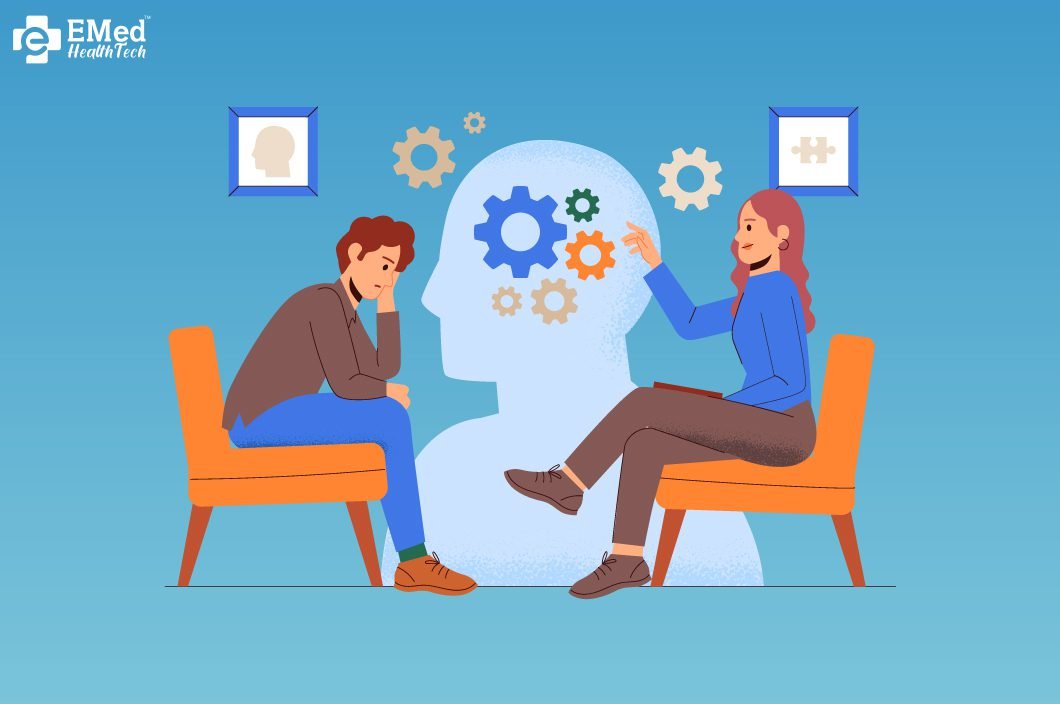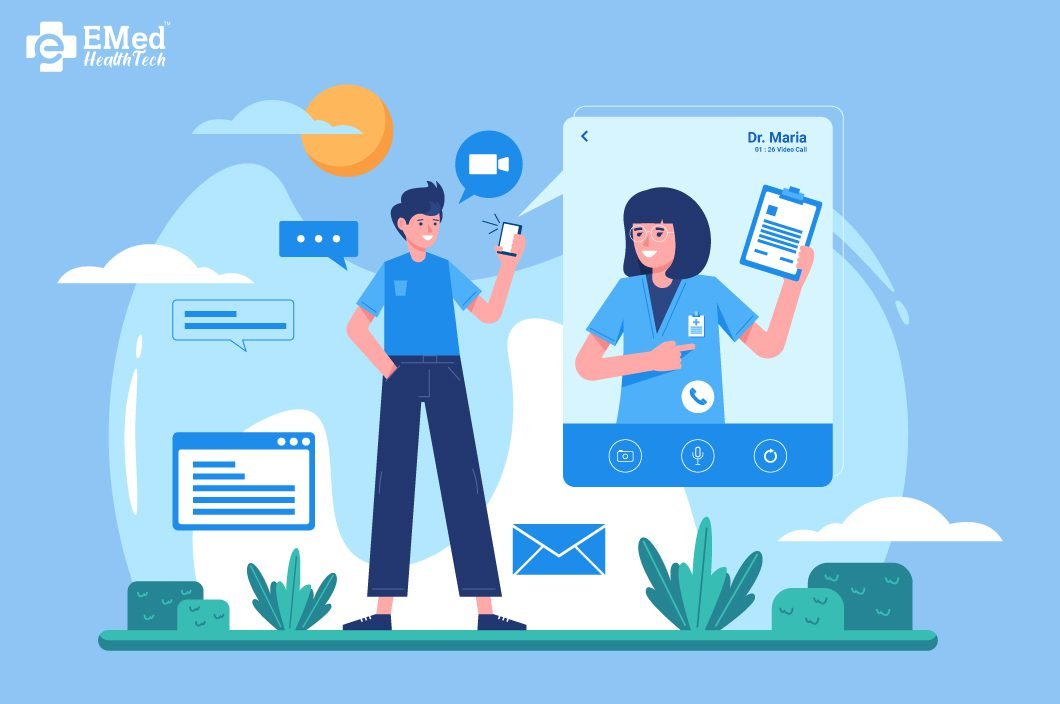The rapid advancement of technology has revolutionized the healthcare industry, paving the way for custom healthcare software development. From telemedicine apps enabling virtual doctor consultations to digital solutions for managing lab reports and tracking vital health metrics, technology has transformed patient care and healthcare operations. Today, custom healthcare software development plays a crucial role in streamlining processes, improving patient outcomes, and enhancing accessibility. With solutions like virtual doctor visits, mobile pharmacies, digital health records, and AI-powered diagnostics, the shift toward personalized and efficient healthcare technology is inevitable.
Let us then take a look at what the numbers suggest:
- Although telemedicine or virtual healthcare has been around for a long time, its usage saw an all-time spike in April of 2020. The usage of virtual healthcare during April 2020 was 78x higher than in February 2020, according to McKinsey and Company.
- The Asia-Pacific regions reported a surge from 4% to 56% during 2021, as per a survey by Willis Towers Watson.
- The Indian telemedicine industry is predicted to have a CAGR of 23.89% from 2020-2025 according to biresearch.com.
Apart from the response from the patients, healthcare providers are also eagerly adopting virtual care and telemedicine software solutions. According to the survey by COVID-19 Healthcare Coalition, more than 60% of healthcare providers found telehealth applications more convenient and more than 50% found more work satisfaction.
What is Healthcare Software Development?

Healthcare software development refers to the process of designing, building, and maintaining digital solutions designed for the needs of the healthcare industry. These solutions aim to enhance patient care, streamline clinical workflows, and improve overall healthcare efficiency.
Healthcare software can include:
- Electronic Health Records (EHR) & Electronic Medical Records (EMR): Digital systems that store patient health data securely.
- Telemedicine Platforms: Apps and software enabling remote consultations between doctors and patients.
- Hospital Management Systems (HMS): Tools that optimize hospital administration, including scheduling, billing, and patient management.
- Medical Billing & Insurance Software: Systems that automate billing, claims processing, and insurance verification.
- Remote Patient Monitoring (RPM) Software: Solutions that track patients’ health conditions using IoT and wearable devices.
- Pharmacy Management Software: Digital solutions for online medicine delivery, inventory tracking, and prescription management.
The goal of healthcare software development is to improve operational efficiency, ensure regulatory compliance, enhance patient engagement, and enable data-driven decision-making in healthcare settings.
Different Types of Healthcare Software
Healthcare software comes in various types, each serving a specific purpose to enhance patient care, streamline operations, and improve healthcare management. Here are some of the most common types of healthcare software:
- Electronic Health Records (EHR) & Electronic Medical Records (EMR): EHR and EMR systems store and manage patient health information digitally, making it easier for healthcare providers to access and update medical records.
- Telemedicine Software: This software enables remote consultations between doctors and patients via video calls, chat, or voice calls, improving accessibility to healthcare services.
- Hospital Management System (HMS): HMS software helps hospitals manage various operations, including patient registration, appointment scheduling, billing, and inventory management.
- Medical Billing & Insurance Software: Automates billing, claims processing, and insurance verification, reducing administrative workload and improving financial management in healthcare facilities.
- Remote Patient Monitoring (RPM) Software: Uses IoT devices and wearables to track patients’ vital signs and health conditions, allowing doctors to monitor them remotely.
- Pharmacy Management Software: Manages online medicine orders, prescription tracking, inventory control, and automated refills for pharmacies and healthcare providers.
- Laboratory Information Management System (LIMS): Helps laboratories manage patient test samples, generate reports, and ensure regulatory compliance.
- Healthcare CRM (Customer Relationship Management) Software: Designed to manage patient interactions, appointment scheduling, and communication for better patient engagement and retention.
- Mental Health & Wellness Apps: These apps focus on mental well-being, offering therapy sessions, meditation, and self-care tracking for users.
- AI-Powered Diagnostic Software: Leverages artificial intelligence and machine learning to analyze medical data and assist in disease diagnosis and treatment planning.
Each type of healthcare software development serves a crucial role in enhancing healthcare delivery, improving patient experience, and optimizing operations for healthcare providers.
Custom Healthcare Software for Patients
The software designed for patients and general users is designed to solve one or the other health issue, monitor health, etc. These apps allow them to seek medical attention if needed. Here are some of the different types of custom software developed for patients.

- Healthcare accessibility software: These are software that allows users who need medical consultation to seek it personally. These are designed to be multifaceted, one of which serves the patient. It allows for easy and convenient consultation which would otherwise take a lot of time and money. It may also have features that allow users to access their laboratory reports, access pharmacies to place orders, and store medical history and access it with ease.
- Mental Health Software: Virtual care has created greater access to mental health services. There is dedicated software that provides the platform for consultations, therapy sessions, etc.
- Health monitoring software: These are the most prevalent form of healthcare software. They provide a plethora of services that help manage health issues. They allow patients to keep track of their illnesses.
- Medication and pharmaceutical services: These apps allow patients to virtually place orders for their medicines, make subscription offers for long-term medications, and more. There are also apps designed to remind patients to take medication on time.
- Lifestyle apps: These are applications that guide users to lead healthy eating habits and hobbies that promote general wellness.
- Fitness apps: These apps cater to those who are looking for personalized solutions to their fitness problems. Solutions like exercise, yoga, activities like sports, and diet plans to help achieve fitness goals.
Custom Healthcare Software Development for Healthcare Professionals
When it comes to custom software development for healthcare practitioners or providers, it caters to a lot of different categories of people and services. Some of these apps have more than one functionality and some have all. Depending upon the need of the medical care facility, they are:

- Telehealth: Applications that provide a platform for healthcare providers to impart their services are referred to as telehealth applications. Telemedicine apps and Doctor appointment booking apps are used by doctors for consultations and make it very convenient for both the doctor and the patient.
- Hospital management software: These are software that is integrated into the hospital system to enable smooth and optimized functioning of the different aspects of a hospital. It also provides data management capabilities, insurance, and payment processing, administrative work, claims management, and patient information.
- Health Record Software: These act as repositories of information, that provides a unified platform to easily access patient records and medical history. Knowing the health records of a patient gives the healthcare professional a better idea of providing treatment.
- E-Medicine order software: Share medicine orders with ease to patients using this application.
- Monitoring software: This software allows healthcare providers to closely monitor the health of patients. This is useful for patients who are chronically ill or are at some incapacity to take care of themselves.
How to Build a Custom Healthcare Software Solution?
Investing in custom healthcare software development is a smart move, as the growing demand for healthcare technology proves its value. A well-built software solution can optimize operations, enhance efficiency, boost revenue, and improve patient satisfaction.
When it comes to developing custom healthcare software, there are two main approaches:
- In-House Development – Hiring an internal team of developers may offer better communication and faster implementation. However, it comes with challenges such as high costs, limited expertise, and scalability issues.
- Outsourcing – Partnering with a custom healthcare software development company allows access to specialized expertise, cost efficiency, and faster development cycles. Many healthcare businesses prefer outsourcing due to its flexibility and access to experienced developers.
Choosing the Right Healthcare Software Development Partner
Before selecting a custom healthcare software development company like EMed HealthTech, consider the following factors:
- Technological Expertise: Ensure the company has experience with the latest healthcare technologies and frameworks.
- Industry Knowledge: A deep understanding of healthcare regulations, compliance (HIPAA, GDPR), and industry standards is crucial.
- Scalability & Capacity: The development team should be able to scale the solution as your business grows.
- Security & Compliance: Since healthcare software deals with sensitive patient data, strong security measures and compliance with regulations are essential.
By carefully evaluating these aspects, you can ensure a successful custom healthcare software development process that meets your business needs while maintaining high security and efficiency.
Why Choose EMed HealthTech for Custom Healthcare Software Development?
EMed HealthTech is a trusted healthcare IT company specializing in custom healthcare software development to enhance efficiency, patient care, and business growth. We provide innovative and scalable solutions tailored to the unique needs of healthcare providers, hospitals, and startups.
Looking to hire healthcare software developers? EMed HealthTech offers expert development services to create secure, compliant, and high-performance medical software. Contact us today for a free consultation and get a custom solution that fits your healthcare business needs.












